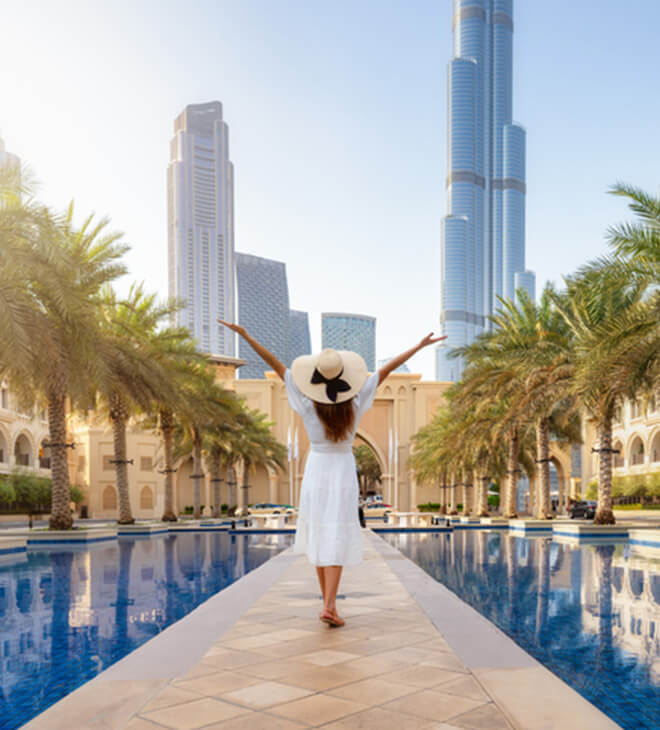Dubai’s tourism boom paying dividends for hotel investors

Dubai’s emergence as a global tourism powerhouse is propelling its hotel sector to unprecedented heights, positioning the city among the largest and most dynamic hospitality markets worldwide.
In the first half of 2024, the emirate welcomed a record 9.31 million international visitors, marking a 9% increase compared to the same period last year. This influx contributed to a record-breaking 21.35 million occupied room nights, setting a new benchmark for the industry and underscoring Dubai’s reputation as one of the world’s leading destinations.
The combination of strategic hotel investments, iconic mixed-use developments like Palm Jumeirah and Downtown Dubai, and a highly dynamic accommodation offering, have made Dubai a magnet for international travellers. From luxury travellers to business executives and budget-conscious families, the city continues to draw visitors across the world, fuelling growth that few other global destinations can match.
With a guestroom inventory nearing 151,000 rooms across 823 establishments, Dubai’s hotel industry now ranks among the world’s largest. It has consistently outperformed expectations, even in the face of global challenges. Between 2013 and 2023, the number of hotel guests staying in the city grew at a compound annual growth rate (CAGR) of 6.32%, reaching 20.3 million last year.
This growth outpaced the rise in international visitors, reflecting both the strength of Dubai’s domestic tourism market and the universal appeal of its hotel offerings.
Furthermore, the number of occupied room nights recorded in Dubai rose from 23.7 million in 2013 to 41.7 million in 2023, marking a CAGR of 5.8%. This remarkable growth has been driven by a combination of increased international tourism, domestic travel, and the city’s ability to host major global events, such as Expo 2020 Dubai.
Diversification driving growth
While Dubai built its reputation on offering ultra-luxurious, exclusive hospitality experiences, the city has successfully expanded its offerings to include more midscale and budget-friendly options over the past decade.
This pivot, which has seen Dubai’s 4-star guestroom inventory expand from just 3,434 in 2000 to over 43,500 in June 2024, has proven instrumental in attracting a broader range of visitors, from families and solo travellers to business delegations and MICE (meetings, incentives, conferences, and exhibitions) groups.
The increasing number of hotel apartment options also reflects Dubai’s strategic bid to attract more long-stay business travellers, families and groups. Since 2000, the number of deluxe hotel apartments operating in the city has grown from just 3,261 to almost 14,000 by the end of 2024, while the number of standard hotel apartments has increased fourfold.
Resilience despite increase in guestroom supply
Dubai’s ability to balance rapid supply growth with strong demand has been critical to its success. Despite a 17% increase in room supply since 2019, Dubai’s average hotel occupancy rates have remained stable, consistently ranging between 77% and 82% over the past decade.
In the first half of 2024, occupancy rates reached 78.7%, up from 77.7% in H1, 2023, and surpassing pre-pandemic levels of 75.6% in H1, 2019. The industry also ranks among the world’s best-performers in terms of revenue per available room (RevPAR). In the first half of 2024, RevPAR climbed to AED 439, a 6% increase compared to H1, 2023, and a 31% rise from 2019 levels.
Guests’ average length of stay also rose from 3.5 nights in 2019 to 3.7 nights in 2023. This trend underscores Dubai’s unrivalled appeal as both a leisure and business destination, with visitors choosing to stay longer in the city and enjoy everything it has to offer.
Foundations for future expansion
According to data from Dubai’s Department of Economy & Tourism (DET), Dubai’s guestroom inventory is projected to exceed 157,000 rooms by the end of 2025, representing a CAGR of 2%. Much of this growth will focus on the city’s midscale and affordable luxury segments.
The number of 4-star guestrooms, for instance, is expected to rise from 43,283 in 2023 to 46,645 by 2025, representing a CAGR of 4%. Similarly, the number of deluxe and superior hotel apartments is forecast to increase from 13,842 in 2023 to 14,887 by 2025, highlighting the growing demand for more flexible accommodation options.
Meanwhile, the city’s 5-star segment is set to maintain steady growth, with guestroom inventory projected to increase from 51,809 in 2023 to 53,771 in 2025. Iconic new developments in areas like Palm Jumeirah and Downtown Dubai are expected to drive this expansion, ensuring Dubai retains its appeal to luxury travellers.
A commitment to sustainable tourism and hospitality development
Dubai’s ambitious vision for tourism, aligned with the Dubai Economic Agenda – D33 and the Dubai 2040 Urban Master Plan, places a strong emphasis on sustainable development.
The latter strategy presents a transformative vision for Dubai, with vast green spaces and recreational areas planned to encompass 60% of the city's urban environment by 2040. The strategy also calls for the total area dedicated to hotels and tourism activities to expand by 134% compared with 2021.
Backed by record-breaking tourism growth in 2024 and ambitious plans for the years ahead, Dubai’s hospitality sector is poised to maintain its upward trajectory, solidifying the city’s status as a global leader in tourism and hospitality.



